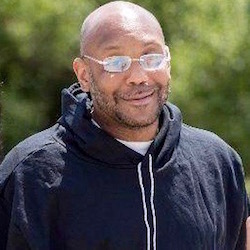 Anthony McDaniels (Photo: Brian Cassella/Chicago Tribune)
McDaniels, who had prior convictions for second degree murder and armed robbery, went to trial in Cook County Circuit Court in February 2011. He chose to have his case decided by a judge without a jury.
Officer Michael Leano testified that he and his partner, Douglas Nichols, were conducting surveillance at 5613 S. Prairie Avenue when they saw McDaniels run out of the building, yelling, “Go, go, go!” Leano said that McDaniels got into the passenger seat and the car drove north to 56th Street and turned east. The car then turned south onto Martin Luther King Drive. When it failed to stop for a stop sign, the officers, who were in an unmarked car, activated emergency lights.
Leano said the car continued south to 59th Street, turned right, and immediately turned northbound into an alley. As they neared the car, Leano said McDonald leaped out and ran through an empty lot. Leano said he pursued McDonald and saw the gun fall from his waistband. He said he stopped to retrieve the weapon and radioed for assistance from other officers who captured McDonald a few blocks away.
Nichols also testified and said that he saw McDaniels get into the car and that a woman was in the back seat—a detail that Leano did not mention. Nichols also testified that the car from which McDaniels fled was driven to the police station at 5101 S. Wentworth Avenue where it was impounded.
Nichols testified that after McDaniels was taken to the station, he said he had purchased the gun for personal protection.
McDaniels’s defense attorney called the man who worked for a private contractor who had towed the vehicle. The tow truck driver testified that he picked up the car at 5613 S. Prairie Avenue—not at the police station.
McDaniels did not testify, although he had insisted to his defense attorney that the officers fabricated the account of the arrest after he refused to accede to their demand to turn over drugs and money.
On February 24, 2011, Circuit Court Judge Arthur Hill Jr. convicted McDaniels of being a felon in possession of a weapon and other weapons possession charges. Judge Hill sentenced McDaniels to 12 years in prison.
In 2012, Watts and fellow officer Kallatt Mohammed were caught on tape stealing money from a man they believed was a drug courier, but who was in fact working as a confidential FBI informant. In 2013, Watts and Mohammed pled guilty in U.S. District Court to taking money from the informant. Mohammed was sentenced to 18 months in prison, and Watts was sentenced to 22 months in prison.
Federal prosecutors said Watts “used his badge and his position as a sergeant with the Chicago Police Department to shield his own criminal activity from law enforcement scrutiny. He recruited another CPD officer into his crimes, stealing drug money and extorting protection payments from the drug dealers who terrorized the community that he [Watts] had sworn to protect.”
In 2006, Ben Baker and his wife, Clarissa Glenn, were convicted of narcotics possession based on false testimony from Watts. In 2016, Joshua Tepfer, an attorney at the Exoneration Project at the University of Chicago Law School, and Jonathan Brayman, of the law firm of Breen & Pugh, filed petitions to vacate the convictions, citing the corruption of Watts and his unit. The Cook County State’s Attorney’s Office’s Conviction Integrity Unit agreed that the convictions should be vacated, and the petitions were granted. In December 2016, Tepfer and attorney Joel Flaxman filed a motion for a new trial on behalf of Lionel White, Sr., another defendant who claimed he had been falsely convicted based on the corruption of Watts and his team. “The full known scope of the corrupt, more-than-decade-long criminal enterprise of Sergeant Watts…shows that Sergeant Watts led a tactical team of Chicago police officers that engaged in systematic extortion, bribery, and other related crimes…from as far back as the late 1990s through 2012,” the motion said.
The Cook County State’s Attorney’s Office’s Conviction Integrity Unit agreed that White’s conviction should be vacated and dismissed the charge.
In April 2017, Tepfer filed a post-conviction petition seeking a new trial for McDaniels claiming that he had been framed by Leano and Nichols and other members of Watts’s crew after he refused to turn over drugs and money to them. The petition quoted Mohammed as telling McDaniels that they would charge him with possession of a gun or the charges would “go away if you give us something.”
In November 2017, following a re-investigation of numerous other cases involving Watts, the Cook County State's Attorney's conviction integrity unit dismissed 17 convictions involving 15 more defendants, including Lionel Lionel White Jr., the son of Lionel White, Sr.
On June 25, 2018, the prosecution agreed to vacate McDaniels’s conviction and dismissed the charges. He was then released from prison. He subsequently filed a federal civil rights lawsuit seeking compensation from the city of Chicago. In January 2019, McDaniels was granted a certificate of innocence and in May 2019, he was awarded $197,000 in compensation from the state of Illinois.
By the fall of 2018, more than 50 convictions tainted by Watts and members of his unit had been dismissed.
– Maurice Possley
|